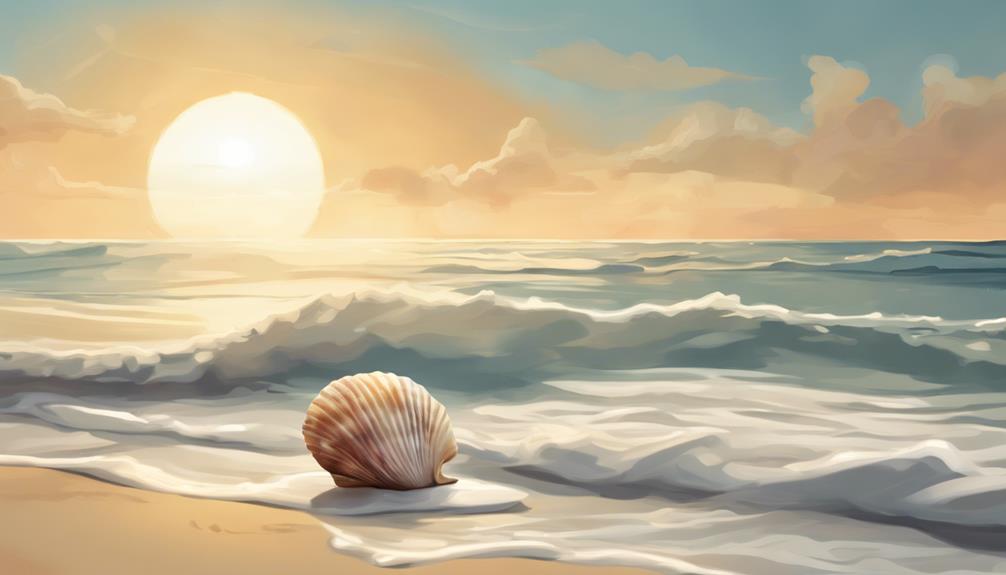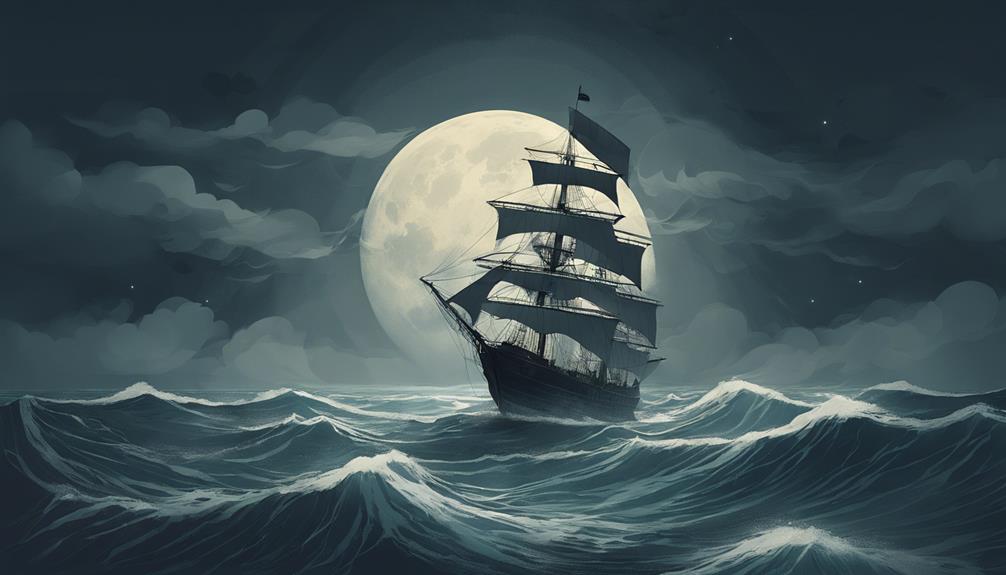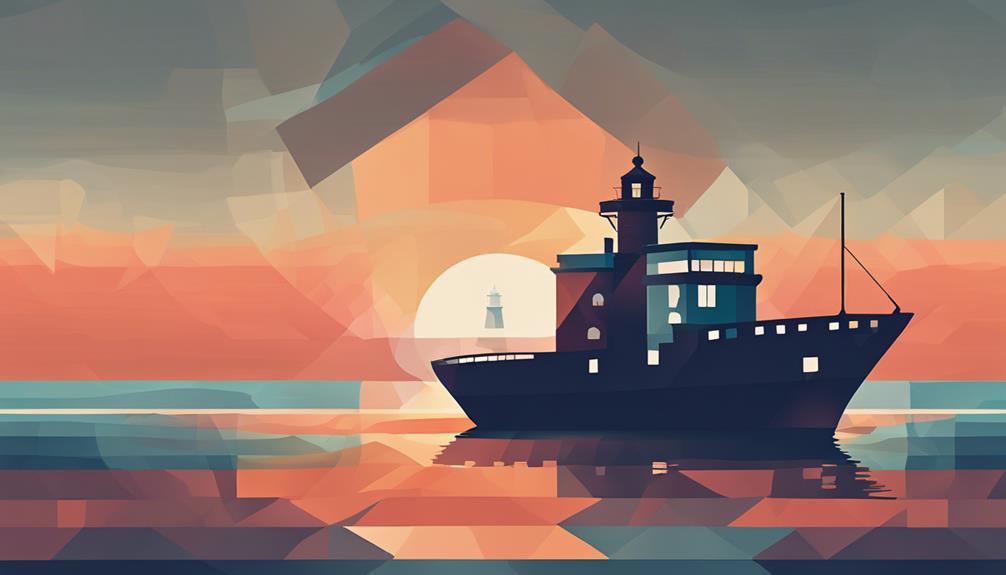Summary
- 1 Origins of Sea Symbolism
- 2 Cultural interpretations and beliefs
- 3 Symbolism of the sea in literature
- 4 Spiritual and Mystical Meaning
- 5 Contemporary marine symbolism
- 6 Frequently asked questions
- 6.1 How does the symbolism of the sea vary among different mythologies?
- 6.2 Are there specific sea symbols associated with luck or protection?
- 6.3 Do different types of bodies of water have different symbolic meanings?
- 6.4 Is there a connection between the symbolism of the sea and astrology?
- 6.5 How has the symbolism of the sea evolved over time in art and fashion?
Explore the deep meanings behind the symbolism of the sea. Through the ages, various cultures have viewed the sea as a transformative force and power. It represents life, fertility and abundance, influencing beliefs and traditions globally. In literature, the sea symbolizes mystery, adventure and the unknown. Spiritually, it embodies renewal, personal change and connection with the universe. Today, the ocean's meaning emphasizes environmental awareness, freedom and resilience. Discover the layers of meaning woven into the symbolism of the sea to reveal its profound impact on human imagination and culture.
Origins of Sea Symbolism

The origins of the symbolism of the sea can be traced to the ancient civilizations in which the vast oceans had profound significance in shaping the cultural beliefs and practices. Imagine standing on the shore of the ancient Mesopotamia, looking at the endless expanse of the sea. For these civilizations, the sea represented a powerful force of nature, embodying both life and death. The Mesopotamians saw the sea as a chaotic, unpredictable and uncontrollable domain, much like the forces of the divine.
Moving across the globe to theancient Greece, we find another perspective on the symbolism of the sea. The Greeks saw the sea as a domain of mystery and adventure, where heroes set out to epic journeys, encountering mythical creatures and overcoming enormous challenges. Poseidon, the god of the sea, had great influence on Greek society, symbolizing both the nurturing and destructive aspects of the ocean.
From the earliest civilizations to modern times, the sea has continued to fascinate thehuman imagination, serving as a symbol of transformation, power and the unknown. As you explore the depths of sea symbolism, remember the ancient roots that have shaped our cultural perceptions of the vast blue expanse.
Cultural interpretations and beliefs
In different cultures, the ocean has different interpretations And beliefs that shape social norms e spiritual practices. In many societies, the sea is seen as a symbol of life, representing birth, fertility and abundance. For example, Polynesian cultures regard the ocean as a source of sustenance and a link to their ancestors. On the other hand, in Japanese culture, the sea is often associated with the purification and renewal, with rituals such as Umi no Hi (Ocean Day) celebrating its importance.
In addition, the immensity and unpredictability of the ocean have led to beliefs in supernatural beings and deities who govern its waters. In Greek mythology, Poseidon was the god of the sea, controlling storms and tides. In Norse folklore, Aegir ruled the oceans, symbolizing both his power and his mysteries.
These cultural interpretations of the sea continue to influence traditions, art and religious practices around the world, highlighting the ocean's profound impact on human societies throughout history.
Symbolism of the sea in literature

In literature, the sea often serves as the powerful symbol representing a myriad of themes and emotions. It can embody the unknown, acting as a metaphor for the mysteries of life, of adventure and exploration. The wide expanse of the sea can symbolize freedom, escape from the constraints of the land, and the unlimited possibilities that lie ahead. At the same time, the nature unpredictable of the sea can represent chaos, danger and the uncontrollable forces of the universe.
In literary works, the sea is often used to evoke feelings of longing, nostalgia, and the passage of time. It can mean a journey, both physical and metaphorical, with the characters crossing the sea to undergo personal transformations Or face challenges. The rhythmic waves of the sea can reflect the ups and downs of human emotions, from tranquility to stormy weather. Authors often employ sea symbols to add layers of meaning to their narratives, inviting readers to further explore the themes of their stories.
Spiritual and Mystical Meaning
Going beyond its literary representation, the sea has deep spiritual and mystical importance, connecting you to deeper dimensions of consciousness and symbolism. Throughout history, the sea has been seen as a symbol of the subconscious mind, representing the vast and often mysterious depths of our inner selves. Just as the sea comes and goes, so does life, symbolizing the cyclical nature of existence and the constant changes we experience.
In many spiritual traditions, the sea is considered a source of renewal and rebirth. Diving into its waters can cleanse not only the body but also the spirit, washing away negative energies and providing a fresh start. The vastness and power of the sea evoke feelings of wonder and humility, reminding you of your place in the grand scheme of the universe.
Moreover, the sea is often associated with the unknown and the infinite possibilities that lie beyond the horizon. Its ever-changing nature reflects the impermanence of life and the need to embrace uncertainty with courage and faith. By meditating on the spiritual and mystical significance of the sea, you can deepen your connection with the mysteries of existence and find solace in the rhythm of the tides.
Contemporary marine symbolism

Investigating modern interpretations, contemporary marine symbolism reflects changing perspectives on the ocean's importance in today's society. As the world changes, so do our views of the sea and what it represents. Here are some key points to ponder:
- Environmental consciousness: The sea is now often seen as a symbol of the environment and the urgent need to protect it. It represents the delicate balance of nature and the impact of human actions on marine life.
- Freedom and adventure: In contemporary symbolism, the sea is frequently associated with freedom, exploration and adventure. It embodies a sense of vastness and endless possibilities, encouraging individuals to step out of their comfort zone.
- Resilience and adaptability: With rising sea levels and climate change threats, the sea has become a symbol of resilience and adaptability. It reminds us of the importance of being flexible and strong in the face of challenges.
These evolving interpretations of marine symbolism reflect our changing values and concerns, highlighting the multifaceted role of the ocean in our modern world.
Frequently asked questions
How does the symbolism of the sea vary among different mythologies?
When we delve into the symbolism of the sea through various mythologies, we discover fascinating variations in interpretation. Different cultures ascribe different meanings to the sea, as life, creation, chaos, or even as a boundary between worlds. Understanding these different perspectives can enrich your understanding of sea-related mythology and symbolism. It is amazing to see how something as vast and impressive as the sea can have such different symbolic meanings in different mythological beliefs.
Are there specific sea symbols associated with luck or protection?
Are you looking for sea symbols related to luck or protection? You are lucky! Many cultures regard certain sea creatures such as dolphins and turtles as symbols of good luck or protection. For example, in Hawaiian folklore, the honu (sea turtle) represents protection and longevity. So if you are looking for a little extra luck or a shield from danger, keep an eye out for these sea symbols in various traditions.
Do different types of bodies of water have different symbolic meanings?
Of course, different bodies of water can actually carry various symbolic meanings. Rivers can represent the flow of life or change, while lakes symbolize tranquility and reflection. Oceans often embody vastness, mystery and power. Each type of water source can evoke distinct emotions and interpretations based on its characteristics and cultural significance. So, yes, the type of water body can have a profound influence on its symbolic meaning and the messages it conveys in different contexts.
Is there a connection between the symbolism of the sea and astrology?
Is there a connection between the symbolism of the sea and astrology? Absolutely! The sea, with its vastness and mystery, often represents the unconscious mind and emotions. Similarly, astrology delves into the depths of our personalities and inner workings. When these two symbolic domains intertwine, they can offer profound understandings of our emotional landscape and spiritual path. Investigating this connection can lead to a deeper understanding of ourselves and the world around us.
How has the symbolism of the sea evolved over time in art and fashion?
Over time, the symbolism of the sea in art and fashion has been transformed, reflecting changes in social values and aesthetic trends. In art, the sea has been represented as a source of both tranquility and turbulence, inspiring artists to explore themes such as freedom, discovery and the unknown. In fashion, designers have incorporated elements such as nautical motifs, shell decorations and ocean colors to evoke a sense of desire for travel and escape. This evolution continues to fascinate audiences around the world.
